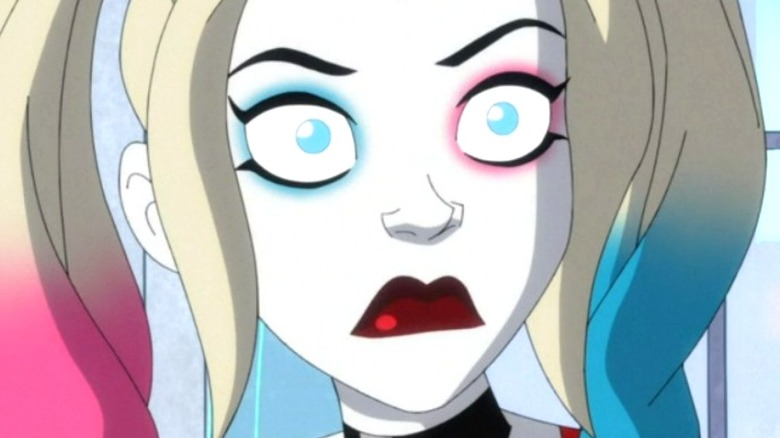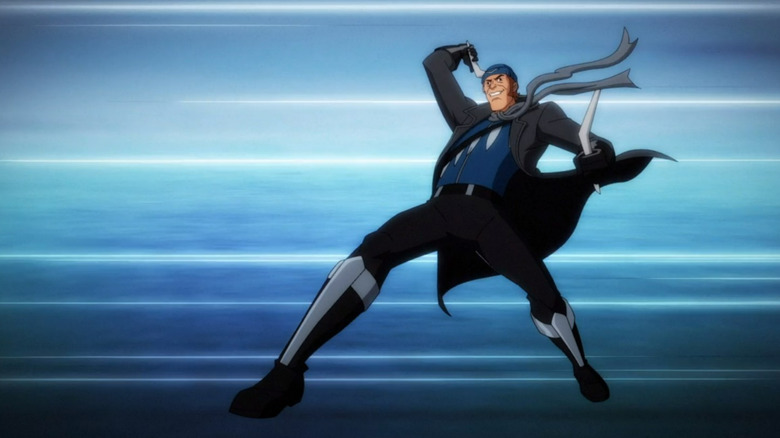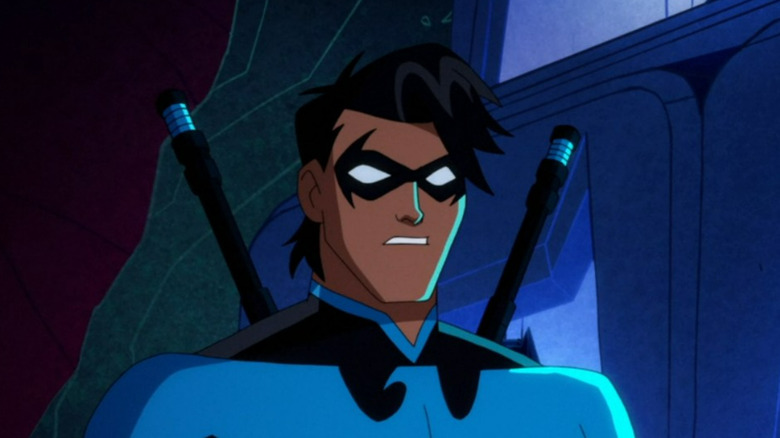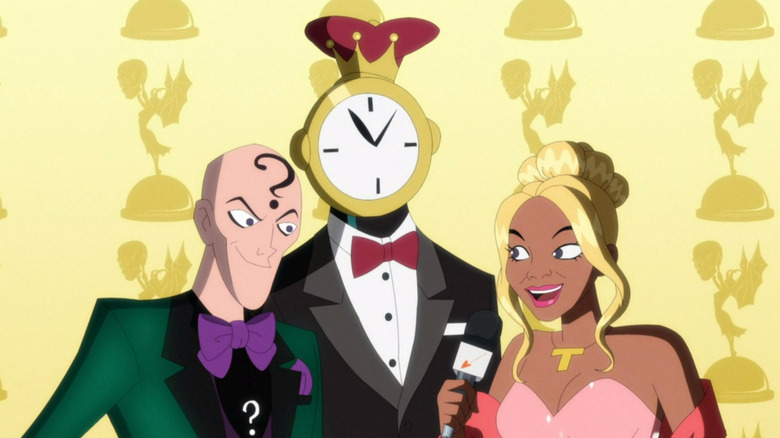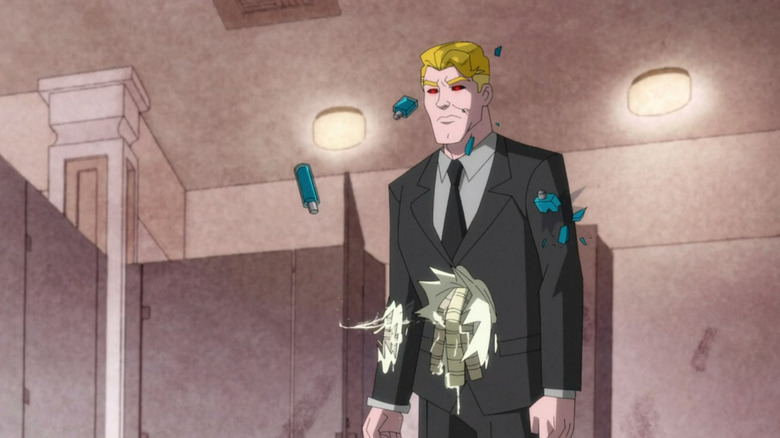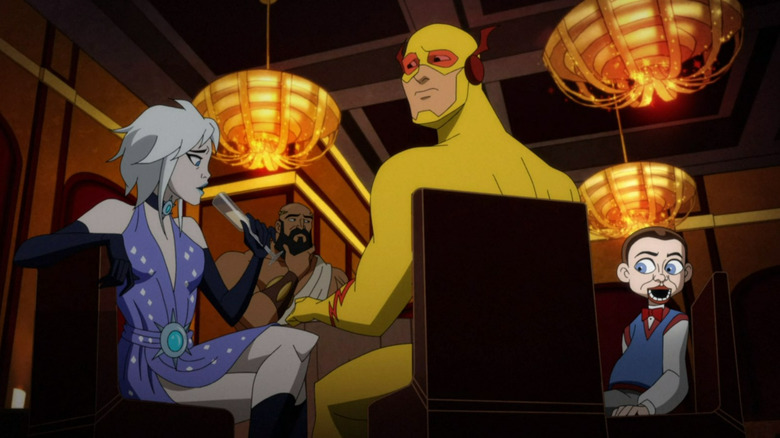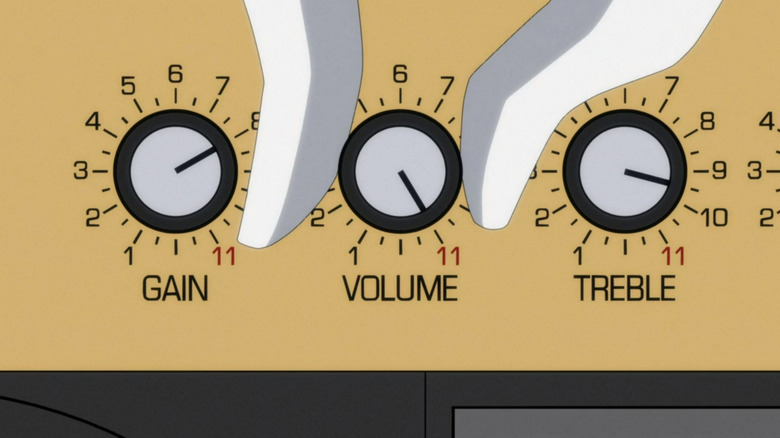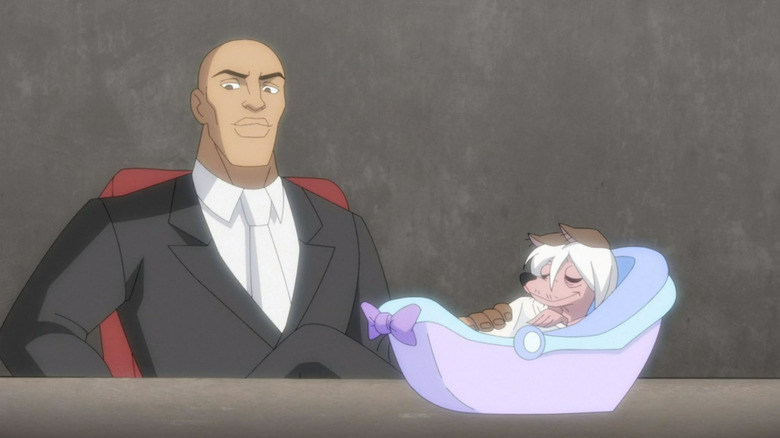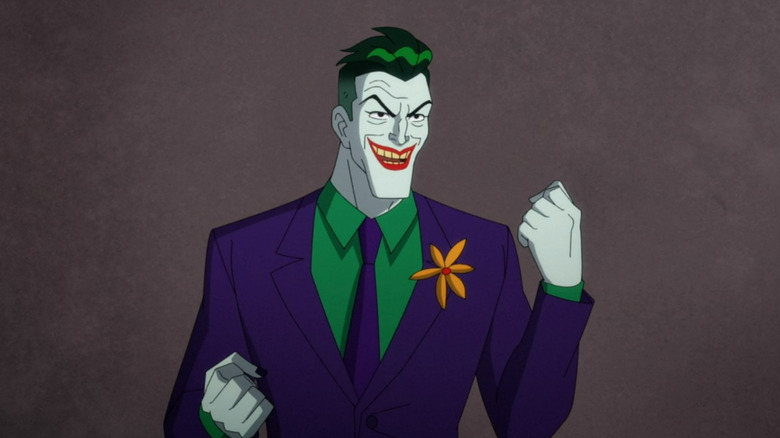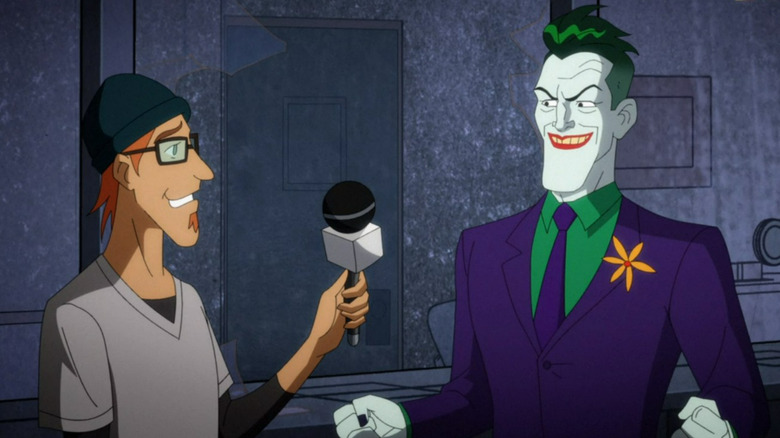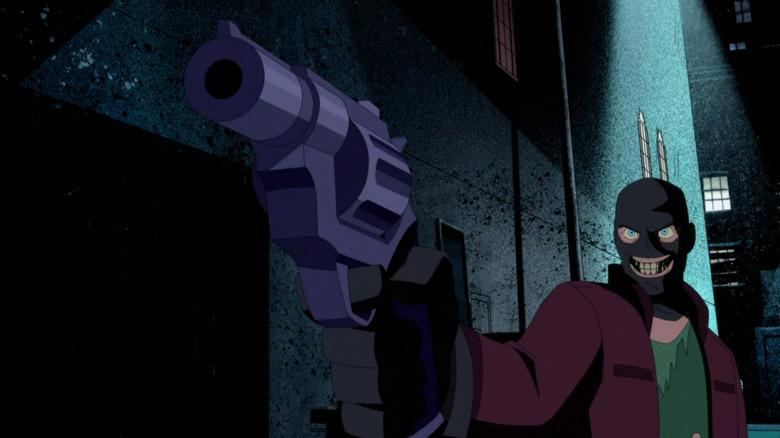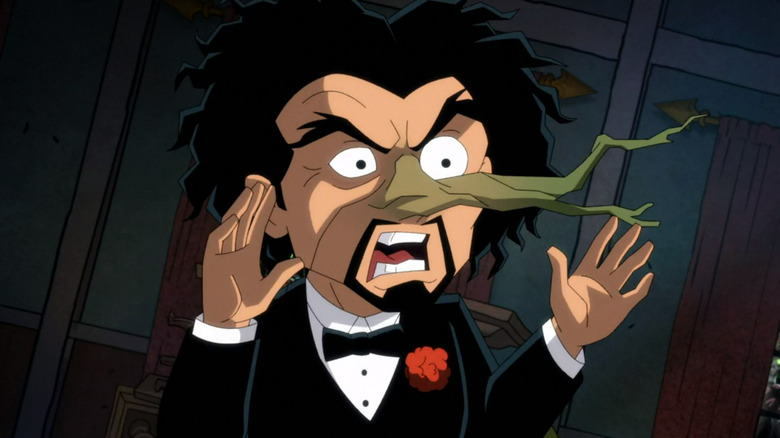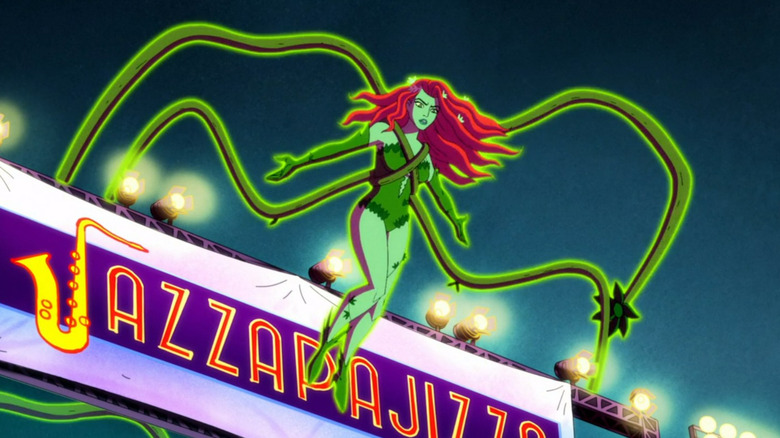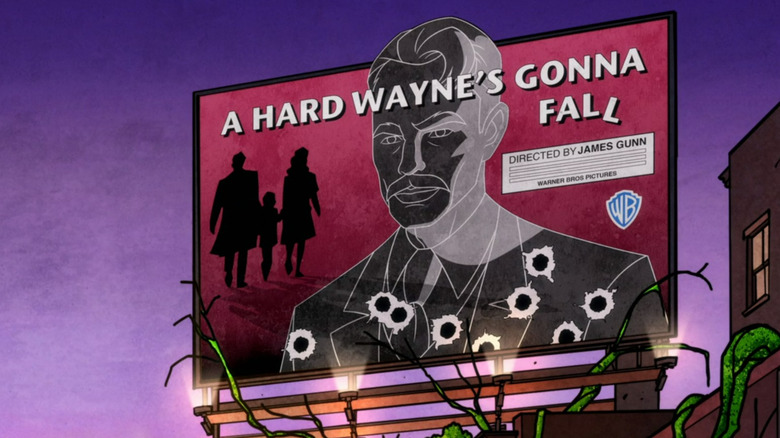Easter Eggs You Missed In Harley Quinn Season 3
"Harley Quinn" Season 3 delivers more of everything fans have come to expect from the HBO Max animated series — clever comedy, brutal violence, and hilarious send-ups of the DC universe. Season 3 is a tight 10 episodes, focusing more than ever before on Harley (Kaley Cuoco) and Poison Ivy's (Lake Bell) relationship. Batman (Diedrich Bader) and the whole Bat Family also get expanded roles.
As in previous seasons, the show tells a longform story over the course of Season 3, but it doesn't take itself too seriously along the way. A lot of the comedy comes from Harley and Ivy's new romantic dynamic, and the story feels a lot more down-to-Earth on the whole compared to Season 1 and Season 2. That leaves plenty of time for kooky hijinks and references, both to the rest of the DC universe and pop culture at large.
If you're a DC fan, you'll know most of the zany characters who pop up from the pages of the comics. However, there are some other little details and wink-and-nod moments that still might fly right by you. Here are some Easter eggs you may have missed in "Harley Quinn" Season 3.
The Suicide Squad intros
Task Force X leader Amanda Waller (Tisha Campbell) makes a brief cameo in "Harley Quinn" Season 3, Episode 1. After claiming that Poison Ivy "hasn't done anything evil in years," Harley decides to kidnap Waller out of spite and present her to Ivy as a sort of gift. Unfortunately, Harley doesn't actually realize who Waller is at the time, so she's wholly unprepared for a retaliatory attack from the Suicide Squad. Of course, the only member of the team who actually shows up is Plastique (Kari Wahlgren).
Despite not appearing in person, the other members of the Suicide Squad still get some flashy intros, which DC fans may recognize as an homage to David Ayer's not-so-beloved 2016 film. In the first live-action "Suicide Squad" movie, each villain gets a colorful introductory montage, complete with their names and talents sprayed across the screen. James Gunn's 2021 reboot used a similar style in its promotional materials, but the particular choice of characters in "Harley Quinn" — Katana, Deadshot, Killer Croc, Captain Boomerang, and Enchantress — seems like a specific nod to the earlier film.
Given that David Ayer's "Suicide Squad" wound up flopping, it's telling that the team doesn't actually show up to save Waller from Harley and Ivy. The show has never shied away from making fun of other corners of the DC universe, and the goofy Suicide Squad intros feel like yet another case of just that.
Titans of parody
Episode 2 of "Harley Quinn" Season 3 sees the debut of Nightwing in the series, voiced by "What We Do in the Shadows" star Harvey Guillén. There have been countless interpretations of the Dick Grayson character over the years, but from his very first scene, the "Harley Quinn" version is a walking parody of his "Titans" counterpart, played by Brenton Thwaites.
The episode opens with a brooding narrative monologue from Nightwing, which is quickly revealed to be occurring on a bus: "Gotham City. Demons are rising up. Criminals breed in the shadows. Blood paints the streets like graffiti." It's the kind of over-the-top edginess that "Titans" was maligned for early on, though the show went on to score high praise from the critics. Later on in the same episode, Nightwing directly references the infamous "Titans" announcement trailer, in which Thwaites' character speaks the heavily-memed "F*** Batman" line. In "Harley Quinn," it's Alfred's vigilante alter ego the Macaroni who's the target of the adolescent insult.
Given that both "Harley Quinn" and "Titans" live on HBO Max, it makes sense for there to be some interplay. A nod to the oft-quoted "Titans" trailer was probably too easy of a joke to pass up.
Award show spoofs
"Harley Quinn" Season 3, Episode 3 centers on the 83rd Annual Supervillain Awards, or Villies, at which Harley and Ivy are nominated in the category of "Best Couple." The whole episode is a treasure trove of deep-cut "Batman" references due to the sheer number of bad guys in attendance, but it also pokes a lot of fun at real-world award shows.
Early on in the ceremony, Harley chats with the Riddler and Clock King, who reveal that they bribed the head of the Gotham Foreign Press in an attempt to secure a win. This is a direct reference to the real-world Hollywood Foreign Press Association — the group behind the Golden Globe Awards. In 2021, the HFPA was thrown into the spotlight by a lengthy exposé from the Los Angeles Times. The report called up decades worth of controversies and scandals, ranging from the organization's exclusive membership and staggering lack of diversity to numerous allegations of accepting bribes for awards consideration. This resulted in boycotts from studios and NBC refusing to televise the 2022 Golden Globes.
Later in the episode, Kite Man (Matt Oberg) says that he was nominated for "Best D-Lister" at the "less publicized but definitely equally prestigious Technical Villy Awards." This is a reference to the Scientific and Technical Oscars, which are still given out by the Academy of Motion Picture Arts and Sciences, but which receive much less attention than the "regular" Academy Awards. In another thinly-veiled jab at the Academy, Catwoman gives a speech about racism in the villain industry after winning her trophy, referencing the numerous criticisms that have been leveled at the Oscars for their lack of diversity.
Milky-blooded androids
In an effort to get her and Ivy a win at the Villies, Harley assaults the man carrying the awards envelopes. Turns out, he's actually a deadly android with impressive strength, and it takes everything Harley's got to take him down in a brutal bathroom brawl. If you're not familiar with the work of famed sci-fi director Ridley Scott, then you might miss the walking Easter egg that is the Villies android. His blood oozes out in a grotesque milky white, just like various cybernetic characters from Scott's work.
The first instance of a milky-blooded bad guy is in "Alien," where science officer Ash (Ian Holm) is revealed to be a villainous android in an iconic and terrifying scene. The director uses the same aesthetic touch in the HBO Max series "Raised by Wolves." In an interview with The New York Times, Scott said that the idea for androids having milky blood came to him suddenly on the set of "Alien." "I think it works great," he said. "It's more uncomfortable than seeing red blood."
Other sci-fi stories have employed the same trope since Scott started the trend. For instance, in the video game "Metal Gear Solid 4," the cybernetic ninja character Raiden bleeds a milky, artificial blood during his various fights. It makes sense that "Harley Quinn" would make the reference too, given all the time the show spends spoofing pop culture.
The other villains at the Villies
"Harley Quinn" Season 3, Episode 3 features a ton of lesser-known DC villains, many of whom are only briefly glimpsed in background shots. As you might expect from the name of the awards show, the Villies bring out a lot of comic book baddies. While some of the characters in attendance are called out directly — like Nora Freeze, Black Manta, and the Riddler — many more are left for viewers to identify on their own.
Among those at the show are "Flash" villains Captain Cold and Reverse Flash, "Wonder Woman" foe Cheetah, "Superman" enemy Livewire, the absurdly dressed Calendar Man, and Doctor Trap, who features prominently in an episode of "Harley Quinn" Season 2. Other antagonists like Sinestro, Solomon Grundy, and KGBeast are also in attendance. At one point, Joker names Catwoman the winner of the Joe Chill Honorary Award, referencing the infamous mugger who killed Bruce Wayne's parents.
There's also a brief "In Memoriam" segment at the Villies, parodying the Oscars tradition. The slideshow features a rundown of the villains Harley and crew have taken out over the course of the series, including Scarecrow, Mr. Freeze, Penguin, and the Queen of Fables.
Turned up to 11
In Episode 4 of "Harley Quinn" Season 3, we learn that Harley has a hobby of shredding on the electric guitar. While Poison Ivy is hard at work perfecting her plant super-serum, Harley, King Shark (Ron Funches), and Clayface (Alan Tudyk) are busy rocking out as The Blacked Pains of Zeerathan — "Gotham's soon-to-be greatest progressive alien deathcore band." In addition to poking fun at the many strange heavy metal subgenres (yes, progressive alien deathcore is a real thing), the scene features a clever nod to the beloved 1984 rock mockumentary "This Is Spinal Tap."
After Ivy asks Harley to turn the music down, she's shown adjusting one of the knobs on her guitar amp from 11 to 10. This mirrors perhaps the most famous scene in "Spinal Tap," in which lead guitarist Nigel Tufnel (Christopher Guest) shows the camera crew his own amps that "go to 11." The line has become somewhat ubiquitous in pop culture in the decades since, and it totally fits that Harley would want to have the extra notch on her own music gear. After all, it's one louder.
Brought to you by Lex Luthor
While he doesn't actually show up in the series that often, Lex Luthor (Giancarlo Esposito) looms large over "Harley Quinn," including in Season 3. The bald mogul reads like a cartoonish Jeff Bezos or Jim Sinegal-type, with multiple characters visiting the obvious Costco parody More-4-Lex at different points throughout the season. When Clayface tricks Billy Bob Thornton into coming over for dinner, he's seen cooking with a jar of "Luthor's Own" brand tomato sauce — a spoof of the late Paul Newman's charity-focused Newman's Own brand.
In the Season 3 finale, while shopping at More-4-Lex, Poison Ivy is called by Lex on the store's many TV screens. He's shown babying a tiny dog in increasingly silly ways, playing into the trope of maniacal bad guys always having helpless pets to keep them company. When you have such a talented star voicing Lex Luthor, it makes sense to make good use of him, and "Harley Quinn" never forgets who the most powerful villain on Earth really is.
Whose Joker is it anyway?
Joker gets an extended moment in the sun in the "Harley Quinn" Season 3 episode "Joker: The Killing Vote," which shows Gotham's Clown Prince of Crime successfully running for mayor of the city on a platform of progressive policies and education reform. It's a funny twist on the character's usual anti-establishment persona, and the writers pull a lot of humor out of the supervillain's transition to politics.
The episode also features a ton of references to the character's more famous modern interpretations. The retro sitcom theme song at the beginning (itself an homage to shows like "Full House") has several references to Heath Ledger's Joker from "The Dark Knight," playing on lines like "Why so serious?" and "I'm an agent of chaos." The song also drops the meme line "We live in a society," which, while not original to "Batman," has been heavily associated with 2019's "Joker" and is even spoken by Jared Leto's version of the character in "Zack Snyder's Justice League."
The rest of the episode includes a couple more "Dark Knight" references. During a political stunt at a bank, one of Joker's clown henchmen shoots another, prompting a rebuke from the boss. "We're not doing the stupid 'Reservoir Dogs' thing," Joker says, referencing both the Quentin Tarantino movie and the bank robbery scene in Nolan's film. Even the climax with Two-Face and Gordon feels like an inversion of the "Dark Knight" ending, with the roles swapped around.
Joker Sanders
In addition to being a reference rundown of every major "Joker" trope from the past few decades, the "Harley Quinn" Season 3 episode "Joker: The Killing Vote" also takes inspiration from real-life political progressives. In particular, the Joker's new public persona and political platform seem to mirror those of U.S. Senator Bernie Sanders.
From declaring before the masses that he is indeed a socialist to the demographic makeup of his staunchest supporters, Mayor Joker reads like a purple-suited parody of the Vermont politician. Young fans of his political agenda are referred to as "Jo Bros" — a clear twist on the "Bernie Bros" tag attributed to Sanders' own youthful supporters. Joker's platform includes many of the same big-picture goals that Sanders has championed over the years, including free universal healthcare, free higher education, and tax accountability for the rich. Some might say that these ambitions are simply common sense, but in the world of "Harley Quinn" — like our own — they seem to be radical notions.
Batman Begins Forever
The "Harley Quinn" Season 3 episode "Batman Begins Forever" is basically a 22-minute Easter egg, filled with knowing jokes about the franchise's past and references to previous iterations of the Caped Crusader. The whole premise that the memory of his parents' death plays over and over in Bruce Wayne's brain is an intentional parody of the origin story's ubiquitous status in pop culture. "It's pretty well-worn territory by this point," Harley says at one point. And she's right.
As Harley dives deeper into Batman's mind, however, the references start coming even faster. There's a refrain of the Danny Elfman "Batman" theme from Tim Burton's 1989 film. There are nods to the 1960s "Batman" TV series ("Holy insert expletive, Batman!") and the "Dark Knight" trilogy ("Why do we fall?"). There's even a clip of Bruce training in martial arts high in some snowy mountains, evoking his origin story from the comics.
At one point, Harley seems to poke fun at the edgy reputation that Batman has taken on in recent times — a version of the character that really wasn't popular until 1980s comics like "Batman: Year One" and "The Dark Knight Returns." "I always thought Batman was a stick in the mud," Harley says while watching some more retro Caped Crusader clips. "But seeing everything you've done all smushed together like that is impressive, and honestly kind of inspiring."
Zombie Pinocchio
In a clear mental lapse, Bruce Wayne alters Poison Ivy's plant super-serum at the end of "Harley Quinn" Season 3 in an attempt to resurrect his dead parents. The result? A horde of the undead laying siege to Gotham from within. The short-lived arc lets the show play with some classic zombie clichés, as well as a curious blink-and-you'll-miss-it Disney reference.
After the initial zombie attack, Doctor Psycho (Tony Hale) is the first living character to get infected. When prodded about his condition, he lies and says that he's fine, prompting a branch to grow out of his nose. The coincidence is a clear reference to the story of Pinocchio, whose nose famously grows longer each time he tells a lie. While no one mentions Pinocchio by name in the scene, Clayface does acknowledge the reference, calling Psycho's transformation "a bit on the nose, even for me."
Of course, this moment is also an homage to the classic zombie movie trope of someone getting infected and hiding the truth from the rest of the group. It's a fate that's laid claim to countless side characters throughout the history of the genre, now including Doctor Psycho.
Doctor Octopus, is that you?
In the penultimate episode of "Harley Quinn" Season 3, Poison Ivy goes on a rampage through Gotham City with an army of plant zombies at her command. Her newfound strength (courtesy of the Green) and outfit change make her even more imposing than she is previously in the show, and she even gets a fun new mode of transportation — vine arms.
For anyone who's seen the Sam Raimi trilogy of "Spider-Man" films, the animation on Ivy's vines should immediately conjure images of Alfred Molina's Doctor Octopus. It's not just that there are four of them coming out of her back — it's the way she moves with them, levitating in the air while the vines walk for her like four giant legs. The movement is exactly the same as how Otto Octavius gets around in "Spider-Man 2," and honestly, it's a great source of inspiration, even if it does come from Marvel instead of the DC universe. Doc Ock features in two of the most acclaimed superhero movies ever made, so who better to serve as a model for Poison Ivy's new look?
A Hard Wayne's A-Gonna Fall
The odd focal point around which much of "Harley Quinn" Season 3 revolves is the Thomas Wayne biopic "A Hard Wayne's Gonna Fall," starring Clayface as Billy Bob Thornton as Thomas Wayne and directed by DC veteran James Gunn (playing himself). The film lingers in the background for most of the season, and its premiere is the venue for the finale, which sees Bruce Wayne arrested for tax fraud.
Music buffs might recognize the title of the fictitious film as a pun on the Bob Dylan song "A Hard Rain's A-Gonna Fall." However, the reference goes deeper than just simple wordplay. Several of the lyrics in Dylan's ballad could easily be superimposed over Bruce Wayne's life, which is fitting given the subject matter of the movie.
"Oh, where have you been, my blue-eyed son?" the song opens. "And where have you been, my darling young one?" Dylan paints a grim picture of the harsh realities of modern life, and several bits in particular seem fitting for Batman. "I've stumbled on the side of 12 misty mountains," Dylan sings. "I heard the sound of a clown who died in an alley ... where the people are many and their hands are all empty." Obviously, the Thomas Wayne movie is basically just one elongated joke, but it's interesting to see that the song chosen works as both a pun and a theme for Batman.
